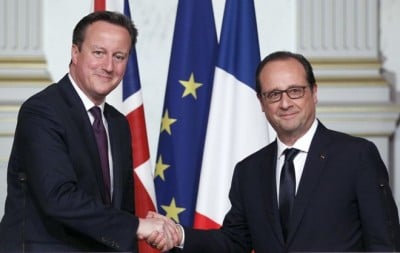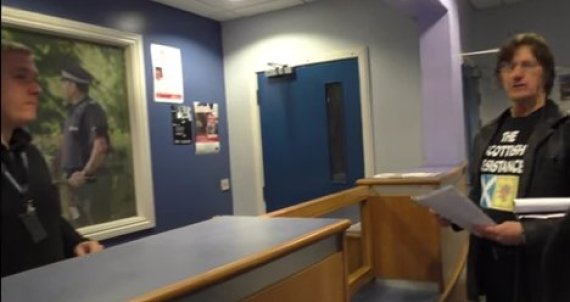David Cameron Reported to Scottish Police For ‘International War Crimes’
Scottish Trio Over Syria Air Strikes

A complaint has been lodged with police calling for David Cameron to be arrested over “international war crimes”, as Britain on Saturday launched its second air strike on Islamic State in Syria.
Representatives of the Scottish Resistance – a pro-independence group – the Indy Amigos and Scottish CND, walked into the Rutherglen Police Station near Glasgow on Friday, brandishing copies of an 87-year-old peace treaty, which they claim Cameron broke last Wednesday when the government passed a vote to extend RAF airstrikes in Syria.
Led by campaigner James Scott, the men told a lone officer that Cameron broke the 1928 Kellogg-Briand Pact by voting to extend RAF airstrikes on Isis from Iraq into Syria.

Signed in Paris by nations including Britain, the US, Germany and France, the treaty pledged to “renounce war as an instrument of national policy”.
Despite it failing to prevent the Second World War, the Scottish Resistance insist the pact is still in force.
A video of the men delivering the complaint, “exactly 37.5 hours after the UK Parliament voted to go to war in Syria”, has been uploaded to YouTube. It has been viewed over 8,000 times.
Scott began by telling the lone police officer, who they later identified as sergeant Brian Scanlan, that: “We have the law here, which you’ll probably have to read.”

He went on: “We’re here to make a criminal complaint against the Prime Minister of the UK, David Cameron .
“He’s gone to war in breach of international law. In 1928, a treaty was made called the Kellogg-Briand pact.
“It was a treaty to end all war. This is the truth.”
The trio left the police station with an incident number for their complaint. Scott concluded: “So hopefully the matter will be properly investigated”.
Piers Douglas-Brown, who was among the group to issue the complaint, applauded the sergeant, as “brave”, for willingness engaging with them.
Douglas-Brown said the officer had told them, “I have no idea this law existed, and you’ve educated me”.
He said: “It looks like police Scotland is a lot more orientated in accommodating these types of incidents than the police down in England.”

